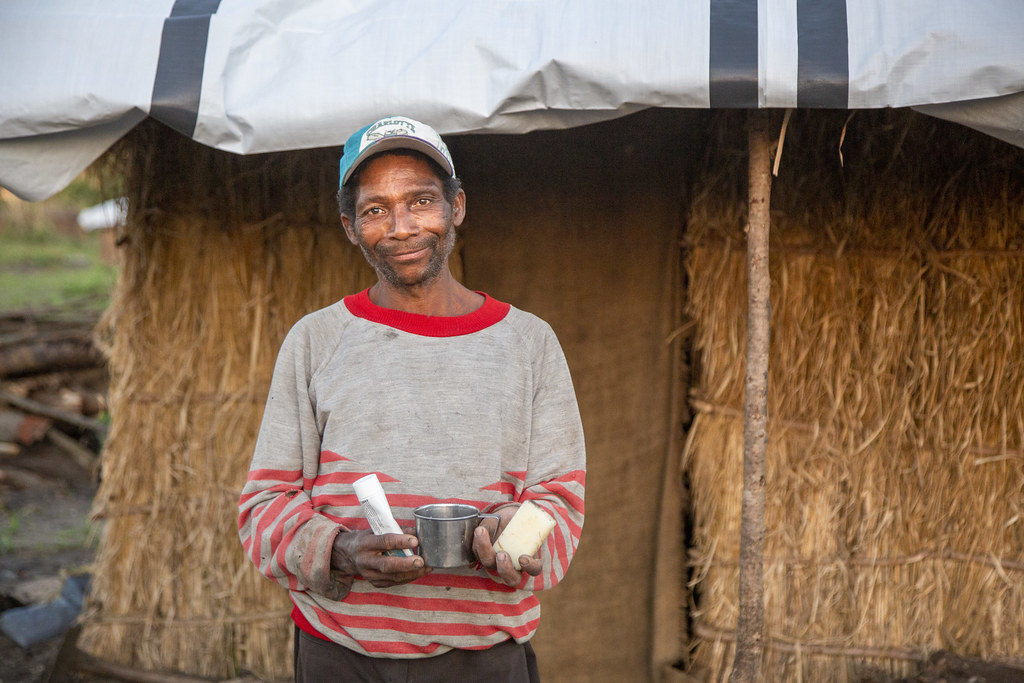“We lost everything and only escaped with our lives,” says Alexandre Uate, who is among hundreds of thousands of people across Mozambique still in need of urgent help following Cyclone Idai, which devastated the region after it struck on March 15.
Alexandre’s most vivid memory of the cyclone’s floods is the moment when a wall of his home caved in while he and his family were still inside. “That was when I knew we had lost everything,” he recalls. “There is no future if you don’t have a house.”

Over 1,000 people were killed by the storm and flooding across flat rural areas in Mozambique, Zimbabwe and Malawi. The World Bank estimates the affected countries will need over $2 billion to recover.
Caritas response so far
Impoverished Mozambique was the worst hit, with the official death toll at 602 people, 240,000 homes totally or partially destroyed, 237,789 families displaced and 715,300 hectares of crops damaged. Over USD 39 million in income was lost.
Mozambique, which has a population of 30 million, also faces a cholera epidemic after the cyclone wiped out water facilities. More than 1.3 million people require emergency food assistance; the destruction of schools is impacting more than 382,000 students; and 433,000 farming families require seeds to grow crops.
Caritas Mozambique and its global partners are providing support to tens of thousands of affected families, distributing food, heavy-duty tarpaulins, medicines, hygiene kits, clothing, bedding, technical assistance, tools and seeds. Caritas also plans to build houses for the displaced.
After the cyclone, Alexandre, 45, his wife, Gina, 35, and their two teenage boys had to flee the community where they have lived all their lives and settle in a new place, where he has started work on a small farm.
Please continue your support to Caritas response in Mozambique
More than 1.3 million people are still in need of emergency aid
Food and livelihood
“The maize that you see growing in the field was planted in April with seeds I received from the Caritas distributions,” he says. “Since we didn’t have anything, everything we received was really crucial.”

“We received kits, including the tools to work with, and kitchen kits,” he adds.
There are many others even less fortunate than Alexandre and his family. Juliana Haine, a mother of five in her mid-60s, says that since her family lost all their food and crops in the cyclone, they have been permanently hungry, worrying about how they will find their next meal.
“We travel to do some jobs for other people then get a little money and can feed ourselves. But this is never enough,” she says. “For a full day’s work, I get one kilogram of rice. Even if my husband also gets another kilo that is not enough to feed seven people for the day. Sometimes we go to bed hungry.”
Caritas distributed food to Juliana and her family. “The food I received today will help me feed my family because I have nothing at home,” she says.
“I am happy and grateful for receiving the food, but the suffering is too much,” she adds. “Don’t give up, continue giving us food, even clothes or blankets because we really have no other place where we can expect help from.”
Pressing needs for clean water and hygiene
Since the cyclone, Sister Marli Terezinha Teixeira, from Brazil, has been at the frontline of the fight to combat disease. Experienced in hygiene and working with families, she travels between communities, talking to people about sanitation, nutrition and taking care of children to avert the danger of cholera and other water-borne or hygiene diseases.

Isaac Julio Martins, 60 years old, in front of the latrines he built in the new home where he has resettled after floods from cyclone Idai in Mozambique. Photo by Dooshima Tsee / Caritas
“We distributed what we call cholera kits [Aquatabs and soap] to people and it really showed me the pressing needs of the communities,” she says. “I saw many families were vulnerable and many didn’t understand the importance of hygiene.”
Sister Marli gives the example of a woman who wouldn’t talk to her or let Caritas workers in her home, refusing to accept water purifying tablets. “I kept going back to see her and just had normal conversations with her,” says Sister Marli. “I showed her love and hugged her and eventually she admitted that she had been feeling ill.”
“It turned out she had cholera and diarrhea,” she adds. “I was able to get her the help she needed and she is now well.”
Sister Marli also helped Cecilia Anthonio Quihane, 71, whose house was damaged and whose family lost all their food in the floods. “It was difficult to keep things clean the first few weeks,” says Cecilia. “Sister [Marli] came after the flood and told us why it was important to keep our surroundings and ourselves clean. We use what they gave us [Aquatabs] to purify our water.”
But, like hundreds of thousands of other people affected by the cyclone, Cecilia and her family’s lives hang in the balance. “We are really suffering after losing everything,” she says. “We need help to get money to buy food, clothes and build a new house. Not just me, but the whole community.”
“Mozambique is facing the impacts of climate change, with the most vulnerable people bearing the brunt of a phenomenon they had no hand in creating. I appeal to the international community to keep its support to the country.”
Ursula Mueller – UN Assistant Secretary-General for Humanitarian Affairs and Deputy Emergency Relief Coordinator



